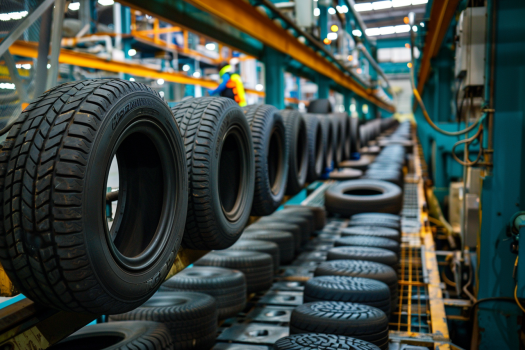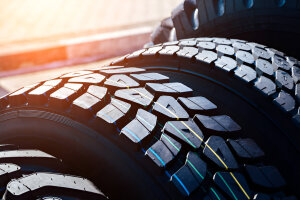Last Updated on December 15, 2024
Nationality of Top Tire Manufacturers and Identifying American Brands
The global tire market is a vast and complex industry characterized by its dynamic nature and technological advancements. It encompasses various manufacturers, from well-established giants to emerging players, each contributing unique styles, technologies, and specialties. According to industry reports, the tire market is driven by various factors, including the growth in automotive production, the rise in demand for replacement tires, and advancements in tire technology.
One of the most significant aspects of the global tire market is its geographical diversity. A single region or country does not dominate the market; instead, it is a tapestry of manufacturers worldwide. American, European, and Asian manufacturers are particularly prominent, bringing their historical background, technological advancements, and market strategies to the forefront.
This global diversity means a broader range of choices regarding quality, performance, and application suitability for truck tires. Truck tires differ significantly from passenger vehicle tires, as they must withstand heavier loads, longer travel distances, and more challenging road conditions. Therefore, understanding the global market is crucial for selecting tires with the best durability, efficiency, and safety combination.

The Importance of Nationality in Tire Manufacturing
The nationality of a tire manufacturer often gives insights into the quality and characteristics of its products. Historically, the tire industry has been shaped by the regional environments in which manufacturers operate. For instance, American tire manufacturers like Goodyear and Cooper are known for producing tires that suit the long highways and varied terrain of the United States. Their tires often emphasize durability and load-bearing capacity, making them suitable for long-haul trucking.
European manufacturers, such as Michelin and Continental, are recognized for their focus on innovation and quality. European roads and regulations have guided these manufacturers to produce tires that excel in fuel efficiency, safety, and performance under diverse weather conditions.
Asian manufacturers, including Bridgestone and Hankook, have risen rapidly in the global market. They offer a balance of quality and value. Their growth is supported by advancements in manufacturing technology and a strong emphasis on research and development.
The nationality of a tire manufacturer also reflects the regulatory standards and market preferences in their country of origin. For example, tires produced for the European market are often designed to meet stricter environmental regulations, focusing on lower emissions and noise levels.
Understanding Tire Nationality
If you don’t already know, a tire brand’s nationality holds more significance than one might initially presume. This section of our comprehensive blog at “Tires Easy Truck” delves into why the nationality of tire manufacturers matters and the criteria used to determine a manufacturer’s nationality.
Significance of Nationality in Tire Manufacturing
A tire manufacturer’s nationality often reflects its heritage, technological expertise, and the specific needs it caters to in its primary market. This can profoundly impact the design and quality of the tires it produces, which is particularly crucial in the trucking industry.
- Cultural and Environmental Influence: The geographic origin of a tire manufacturer can influence its product design to suit local climates, road conditions, and driving habits. For example, European brands might focus more on wet-weather performance, reflecting the environment in many parts of Europe. Meanwhile, American brands emphasize durability and load-carrying capacity, catering to the long-haul, heavy-duty nature of American trucking.
- Technological Advancements: Different countries often have varying focuses in terms of technological development. Japanese manufacturers, for instance, are known for their advancements in rubber compound technology. At the same time, German brands may emphasize precision engineering and performance.
- Regulatory Compliance: Manufacturers often design their tires to comply with the regulatory standards of their home country. This can affect their global product offerings, as tires made for the European market might focus more on environmental standards like lower rolling resistance. In contrast, those made for the American market might prioritize load and speed ratings.
Criteria for Determining a Manufacturer’s Nationality
Determining a tire manufacturer’s nationality is only sometimes straightforward, as globalization has led to complex corporate structures and international production facilities. However, critical criteria can help identify a manufacturer’s nationality.
- Location of Headquarters: A company’s headquarters is often a primary indicator of its nationality. This is usually where significant decisions are made, and the company’s core values and strategies are developed.
- History and Origin: A company’s history and origin can also play a significant role. A brand that originated in a particular country and has a long history there may still strongly identify with that nationality, even if it has since become a global entity.
- Manufacturing Facilities: The location of a company’s primary manufacturing facilities can influence its nationality. However, this must be clarified in today’s global economy, as many companies have factories worldwide.
- Research and Development (R&D) Centers: The location of a company’s R&D centers can indicate where it focuses its technological and design efforts, often aligned with its country of origin.
- Ownership and Corporate Structure: The nationality of the majority shareholders or parent company can also influence a brand’s nationality. However, this can be complex in cases where there is significant foreign investment or when companies are multinational.
American Tire Manufacturers for Trucks
The United States boasts a rich history in tire manufacturing, particularly for trucks. Renowned for their innovation and quality, American tire manufacturers have been at the forefront of the tire industry, offering products that cater specifically to the diverse and demanding needs of the trucking sector. This segment of our comprehensive blog at “Tires Easy Truck” focuses on prominent American tire manufacturers and their contributions to the trucking industry.
Goodyear Tire and Rubber Company
Goodyear, founded in 1898 in Akron, Ohio, has grown to become one of the world’s largest tire companies. Renowned for its commitment to innovation and quality, Goodyear has a significant presence in the truck tire market.
- Innovation and Technology: Goodyear has pioneered tire technology, introducing notable advancements such as the first tubeless tire in 1903 and the first radial tire for trucks in North America. Their focus on R&D continues to drive the development of high-quality, durable tires suited for various trucking needs.
- Product Range: Goodyear offers an extensive range of truck tires, catering to segments like long-haul, regional, on/off-road, and urban. Each tire line is designed to address specific challenges, such as fuel efficiency, durability, and load capacity.
- Sustainability Initiatives: Goodyear is also known for its efforts in sustainability. It works towards producing environmentally friendly tires without compromising performance or safety. This includes increasing tire longevity and reducing rolling resistance for better fuel efficiency.
Cooper Tire & Rubber Company
Founded in 1914, Cooper Tire & Rubber Company, headquartered in Findlay, Ohio, is another major player in the American tire industry, primarily known for its truck tires.
- Quality and Affordability: Cooper is well-regarded for offering a balance of quality and affordability. Their truck tires are designed to provide reliable performance, durability, and safety, all at a competitive price point.
- Range of Products: Cooper’s truck tire lineup includes tires for various applications, including long-haul, regional, mixed service (on and off-road), and pick-up and delivery. Their tires are known for their sturdy construction and ability to handle heavy loads.
- Customer-Centric Approach: Cooper emphasizes customer satisfaction and feedback in their tire development process, ensuring that their products meet the practical needs of truckers and fleet managers.
Other Notable American Brands
Beyond Goodyear and Cooper, several other American brands contribute significantly to the truck tire market.
- Firestone: Part of Bridgestone Americas since 1988, Firestone retains a strong American heritage and is known for its durable and reliable truck tires.
- General Tire: A part of Continental Tire, it has a long history in the U.S. and is known for its high-quality tires suitable for various trucking applications.
European Giants in the Tire Industry
Europe has long been a hub for tire manufacturing excellence, home to some of the world’s most prestigious and innovative tire companies. These European giants have significantly shaped the global tire industry with their rich history and forward-thinking approach. In this section of the “Tires Easy Truck” blog, we explore three major European tire manufacturers – Michelin, Continental AG, and Pirelli – and their impact on the tire market, particularly in the trucking segment.
Michelin (France)
Michelin, based in Clermont-Ferrand, France, is a titan in the tire industry and a symbol of innovation and quality. Founded in 1889, Michelin has a long-standing reputation for producing some of the world’s most reliable and high-performing tires.
- Innovation and Technology: Michelin is renowned for its technological advancements. The company is credited with inventing the radial tire in 1946, a breakthrough that significantly improved tire longevity and vehicle performance. Michelin continues to invest heavily in research and development, focusing on creating more efficient and sustainable tire solutions.
- Product Range for Trucks: Michelin offers a comprehensive range of truck tires that cater to various needs, including long-haul, regional transport, urban, and construction vehicles. Their truck tires are known for their durability, fuel efficiency, and safety features.
- Sustainability Initiatives: Michelin is a leader in environmental sustainability in the tire industry. The company is committed to reducing the environmental impact of its tires throughout their life cycle, from production to recycling.
Continental AG (Germany)
Continental, headquartered in Hanover, Germany, is another major force in the tire industry. Founded in 1871, Continental has built a reputation for high-quality tires that combine safety, performance, and environmental sustainability.
- Technological Leadership: Continental is recognized for its emphasis on technology and innovation. The company invests in developing intelligent tire technologies, including advanced tread patterns and compounds, to enhance road safety and performance.
- Diverse Range for Trucks: Continental offers a wide range of truck tires, including those for long-haul, regional, urban, and off-road use. These tires are designed to meet the high demands of efficiency, durability, and safety in the trucking industry.
- Commitment to Sustainability: Continental is actively reducing the carbon footprint of its tire production and products. The company focuses on developing eco-friendly tires with reduced rolling resistance, leading to lower fuel consumption and CO2 emissions.
Pirelli (Italy)
Pirelli, headquartered in Milan, Italy, is synonymous with high-performance tires. Founded in 1872, Pirelli has established itself as a premium tire manufacturer with a strong focus on high-end vehicle segments.

- High-Performance Focus: Pirelli is mainly known for its high-performance tires, resulting from its deep involvement in motorsport. This expertise is also evident in its truck tire offerings, where performance and reliability are paramount.
- Truck Tire Range: Pirelli’s truck tires are designed to offer maximum reliability and safety. The company provides tires for various applications, including long-haul, regional, and on/off-road trucks.
- Innovation and Quality: Pirelli’s commitment to innovation is evident in its product development. It focuses on producing tires that offer superior handling, durability, and fuel efficiency.
Asian Dominance in Tire Manufacturing
The tire manufacturing industry has seen a significant shift towards Asia, with countries like Japan and South Korea emerging as critical players. Asian tire manufacturers, known for their innovative approach and commitment to quality, have been gaining prominence in the global market. In this segment of the “Tires Easy Truck” blog, we explore the contributions of three major Asian tire manufacturers – Bridgestone Corporation, Yokohama Rubber Company, and Hankook Tire – and their impact on the tire industry, particularly in the trucking sector.
Bridgestone Corporation (Japan)
Bridgestone, headquartered in Tokyo, Japan, is the world’s largest tire manufacturer. Founded in 1931, it has established a formidable presence in the global tire market and is known for its commitment to innovation, quality, and sustainability.
- Innovation and Diverse Product Range: Bridgestone has been at the forefront of tire technology, pioneering numerous advancements such as run-flat technology and eco-friendly tires. The company offers a wide range of truck tires, catering to various needs from long-haul to regional and urban applications. These tires are renowned for their durability, fuel efficiency, and high performance.
- Global Presence and Sustainability: Bridgestone’s global operations allow it to cater to a diverse market, adapting to the unique needs of different regions. The company is also focused on sustainability, aiming to create products that reduce CO2 emissions and are environmentally friendly.
Yokohama Rubber Company (Japan)
Yokohama, another major Japanese tire manufacturer, was founded in 1917. The company has made a name for itself by producing high-quality tires with superior performance and reliability.
- Technological Advancements: Yokohama is known for its innovative approach to tire manufacturing. The company invests in cutting-edge technology to produce tires with excellent traction, stability, and fuel efficiency.
- Truck Tire Offerings: Yokohama’s truck tires are designed to meet the rigorous demands of the trucking industry. Yokohama tires are famous for commercial trucks and light-duty vehicles because they focus on longevity, fuel efficiency, and all-weather performance.
- Environmental Initiatives: Yokohama is dedicated to reducing the environmental impact of its tires, with initiatives aimed at reducing waste and improving the recyclability of its products.
Hankook Tire (South Korea)
Hankook Tire, headquartered in Seoul, South Korea, is one of the fastest-growing tire manufacturers in the world. Founded in 1941, Hankook has gained recognition for its high-quality, innovative tire solutions.
- Rapid Growth and Innovation: Hankook has experienced rapid growth due to its focus on technology and quality. The company is known for its research and development efforts, which have led to advanced tire designs and compounds.
- Extensive Truck Tire Range: Hankook offers a comprehensive range of truck tires, including long-haul, regional, and off-road applications. These tires are designed for durability, safety, and performance, catering to the diverse needs of the trucking industry.
- Global Ambitions and Sustainability: With a vision to become a leading global tire company, Hankook invests in sustainable practices and technologies. The company aims to provide environmentally friendly tire solutions without compromising on performance.
Other Global Players in the Tire Industry
While American, European, and Asian manufacturers dominate the tire industry, other countries contribute significantly to the global market. These international players bring unique perspectives, innovations, and specialties to tire manufacturing, enhancing the industry’s diversity and richness. In this part of the “Tires Easy Truck” blog, we provide an overview of critical manufacturers from various countries and examine the impact of this global diversity in tire manufacturing on the trucking industry.
Overview of Key Manufacturers from Various Countries
- Apollo Tyres (India): Apollo Tyres, headquartered in Gurgaon, India, has grown significantly since its inception in 1972. Known for its cost-effective and durable tire solutions, Apollo offers a wide range of truck tires that provide a good balance between performance and affordability.
- Sumitomo Rubber Industries (Japan): Though smaller than Bridgestone or Yokohama, Sumitomo still plays a significant role in the global tire market. It is known for its innovative approaches to tire technology and has a strong presence in the truck tire segment.
- Nokian Tyres (Finland): It specializes in tires for harsh and demanding environments and is known for its winter tires. They bring unique expertise to the trucking industry, especially for vehicles operating in extreme conditions.
- Kumho Tire (South Korea): As one of South Korea’s leading tire manufacturers, Kumho Tire offers a range of innovative and reliable truck tires. Its focus is on producing high-performance yet affordable products.
Impact of Global Diversity in Tire Manufacturing on Trucking
The diversity in the global tire manufacturing industry significantly impacts the trucking sector. This variety offers truck operators and fleet managers various choices to suit their needs and preferences.
- Innovation and Specialization: Different manufacturers bring unique innovations and specializations. For example, Nokian’s expertise in winter tires is invaluable for trucks operating in cold climates, while Sumitomo’s advancements in rubber technology benefit trucks requiring durable and high-performing tires.
- Competition and Choice: The presence of various global players creates healthy competition in the market, leading to better quality and more choices for consumers. Truck operators can select tires that best match their operational requirements and budget constraints.
- Global Standards and Quality: The diverse origins of tire manufacturers contribute to establishing international standards in tire quality and performance. This ensures that regardless of where the tires are manufactured, they meet specific safety and performance benchmarks, which is crucial for the trucking industry.
- Cultural and Environmental Adaptation: Manufacturers from different regions understand the unique needs of their local markets, which leads to the production of tires that are well-suited for specific environmental conditions and driving habits. This global perspective allows for highly specialized tires for various terrains and weather conditions.
Factors to Consider Beyond Nationality
While the nationality of a tire manufacturer can give insights into the quality and type of tires they produce, there are several other critical factors to consider:
- Tire Type and Size: Ensure the tire size matches your truck specifications. Also, choose the type (e.g., all-season, winter, off-road) based on the driving conditions you most frequently encounter.
- Load Capacity: The tire must handle the maximum load of your truck. Overloading can cause tire failure and pose serious safety risks.
- Tread Pattern: The tread pattern affects traction, fuel efficiency, and noise. For instance, deeper treads with more significant gaps are better for off-road conditions, while shallower treads are ideal for highway driving.
- Rubber Composition: The composition of the tire affects durability and performance. For example, softer rubber compounds provide better grip but may wear out faster.
- Fuel Efficiency: Look for tires with low rolling resistance to improve fuel efficiency. This is especially important for long-haul trucks.
- Weather Conditions: Consider the climate and weather conditions in your operating areas. Tires designed for specific weather conditions (like snow tires) can significantly enhance safety and performance.
- Durability and Lifespan: Assess the tire’s lifespan and durability. Longer-lasting tires might be more expensive initially but can be more cost-effective in the long run.
- Warranty and Support: Check the warranty and after-sales support provided by the manufacturer. This can be crucial for maintenance and addressing potential tire issues.
Recommendations Based on Trucking Needs and Conditions
We delve into tailored recommendations for truck tires based on various trucking needs and conditions, ensuring that your choice aligns perfectly with your specific requirements and operational environments.
- For Long-Haul Trucking: Prioritize fuel efficiency, durability, and comfort. Look for tires with low rolling resistance, reinforced sidewalls for load capacity, and noise-reduction features.
- For Regional Hauling: Choose tires that balance durability with flexibility. Tires should be able to handle varying road conditions and frequent starts and stops.
- For Urban Conditions: Urban trucking involves a lot of stop-and-go traffic. Tires with good traction, wear resistance, and reinforced sidewalls to withstand curb impacts are ideal.
- For Off-Road Use: If your trucking involves off-road conditions, opt for tires with aggressive tread patterns, strong traction, and resistance to cuts and abrasions.
- For Varied Weather Conditions: Consider all-season or specialized winter tires for snowy and icy conditions in areas with diverse weather conditions.
- For Specialized Operations: If your trucking operations are specialized, such as transporting hazardous materials or working in extreme conditions, consult tire professionals to find tires that meet specific safety and performance standards.
The Future of Tire Manufacturing and National Trends
The tire industry is constantly evolving, with new technologies, materials, and manufacturing processes emerging to meet the changing demands of the global market. In this forward-looking segment of the “Tires Easy Truck” blog, we explore the future of tire manufacturing, focusing on emerging manufacturers and countries and trends and predictions for the truck tire market.
Emerging Manufacturers and Countries
In recent years, the tire manufacturing landscape has seen the rise of new players and countries, each bringing fresh perspectives and innovations to the industry.
- China’s Growing Influence: China has emerged as a significant player in the tire manufacturing industry. Chinese companies like Zhongce Rubber Group and Linglong Tire are expanding rapidly, offering competitive pricing and improving quality. They are increasingly focusing on technological advancements to compete globally.
- India’s Market Potential: India is another country to watch in the tire industry. Manufacturers like Apollo Tyres and MRF are gaining recognition for their quality products and are investing heavily in R&D to elevate their global presence.
- Eastern Europe’s Development: Countries in Eastern Europe, such as Poland and Romania, are becoming essential hubs for tire manufacturing due to their strategic location, skilled workforce, and growing technological capabilities.
Trends and Predictions for the Truck Tire Market
The truck tire market is undergoing significant changes, driven by technological advancements, environmental concerns, and evolving market needs.
- Increased Focus on Sustainability: There is a growing trend towards eco-friendly tire manufacturing. This includes using sustainable materials, expanded recycling efforts, and the development of tires with lower rolling resistance to reduce fuel consumption and CO2 emissions.
- Advancements in Tire Technology: Technologies like innovative tires equipped with sensors for real-time monitoring of tire pressure and temperature are becoming more prevalent. These advancements improve safety, efficiency, and cost savings for truck operators.
- Rise of Airless Tires: Airless tires, or non-pneumatic tires, are being developed to avoid punctures and blowouts, offering increased safety and reduced maintenance. While still in the early stages for heavy-duty trucks, they hold promise for the future.
- Customization and Specialization: Tires are increasingly customized for specific applications and conditions. This includes specialized tires for electric trucks, which may have different weight distributions and torque characteristics than traditional trucks.
- Shift Towards Online Sales and Services: The tire industry is adapting to the digital age, with an increase in online sales platforms and digital services. This trend is expected to continue, offering convenience and expanded customer choices.
- Global Economic and Political Influences: Economic and political factors will continue to impact the tire industry. Trade policies, environmental regulations, and international economic trends will shape the future of tire manufacturing and distribution.
Final Thoughts on the Importance of Understanding Tire Nationality
Knowing where tire manufacturers come from is essential in the trucking industry. It gives valuable information about the quality, performance, and reliability of the tires. This is key because the type of tires used affects the safety and efficiency of trucking. Understanding the origin of the tires helps match them with the right driving conditions, load needs, and performance standards, ensuring they work well and keep the road safe.
Furthermore, the nationality of a tire manufacturer often reflects the regulatory standards, technological advancements, and driving conditions prevalent in their country of origin, which can significantly influence the suitability of their tires for different applications and environments.
Transition to Tires Easy Truck
In light of these insights, it becomes evident that choosing the right tire is a critical decision for any truck owner or fleet manager. At “Tires Easy Truck,” we understand the importance of equipping your trucks with the best tires that meet and exceed your performance, durability, and safety expectations. Our extensive range of tires includes options from leading manufacturers worldwide, ensuring that you have access to the best products irrespective of their nationality.
We invite you to visit “Tires Easy Truck” at https://www.tires-easy-truck.com/ to explore our selection of premium tires. Whether you’re looking for American robustness, European innovation, or Asian affordability, we have the right tire to meet your trucking needs. Choose “Tires Easy Truck” for a seamless and informed tire buying experience, where quality and customer satisfaction are our top priorities.
Find the Perfect Tire for Your Truck – Shop Now
FAQS
1. How do I find the manufactured country of a tire?
To determine a tire’s country of manufacture, look for the DOT (Department of Transportation) code on its sidewall. This alphanumeric code reveals the place and date of manufacture, providing insight into the tire’s origins.
2. Who is the biggest tire manufacturer in the world?
Based in France, Michelin is currently the world’s largest tire manufacturer. This company is renowned for its innovation, quality, and global presence in the tire industry.
3. Where can I find tire details?
Tire details can be found on the sidewall of your current tires, in your vehicle’s handbook, or on a sticker in the door jam or inside the fuel cap door. These details ensure that new tires match your vehicle’s requirements.
4. How do I know if my tires are real?
To verify the authenticity of a tire, check the tread depth against the specifications listed on the brand’s official website. Discrepancies in tread depth may indicate a counterfeit or used tire being resold as new. Always purchase tires from reputable dealers to ensure authenticity.
5. What are the top 10 tire brands?
The top 10 tire brands, notably recognized in India, include MRF, CEAT, Apollo, JK Tyre, Bridgestone, Goodyear, Continental, Michelin, Yokohama, and Pirelli. These brands are known for their quality, innovation, and wide range of products suitable for various vehicles.
6. Why is the nationality of a tire manufacturer important?
The nationality can reflect the manufacturing standards, technological focus, and the specific automotive needs the company targets, influenced by regional driving conditions, regulations, and market preferences.
7. Which are the leading American tire manufacturers?
Prominent American tire manufacturers include Goodyear Tire and Rubber Company, Cooper Tire & Rubber Company, and Firestone Tire and Rubber Company, known for their robust and versatile tire designs suitable for diverse terrains.
8. How does the nationality of a tire manufacturer affect its products?
The nationality influences a manufacturer’s product design and technology. For instance, European brands often focus on fuel efficiency and performance, while American brands may prioritize durability and load capacity.

















 English
English Français
Français Español
Español